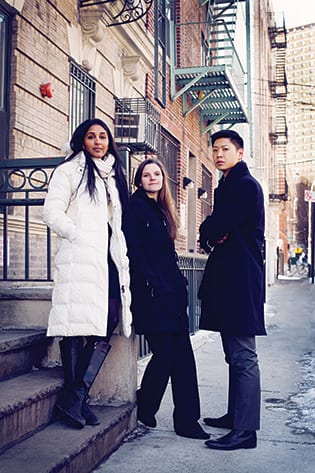By Jon Jefferson

For most law students, graduation triggers a diaspora, a parting of the ways. But for three members of Berkeley Law’s class of 2014—Anisha Gupta, Chris Lau, and Emily Gladden—graduating has bound them together, as colleagues and as roommates.
First came the jobs: They’re staff attorneys at The Bronx Defenders, a nonprofit criminal defense firm whose unique focus appealed to them. “The Bronx Defenders uses a distinctive, holistic model,” Gupta said. “We provide representation not just in criminal court cases, but also in other, interrelated areas of life: fighting eviction; helping people get their children back; applying for citizenship or for public benefits, such as food stamps.”
Added Gladden, “Sometimes those issues are even more important than criminal proceedings.” In college, Gladden worked in public defender offices. “I saw a lot of client frustration,” she said, “with problems that a purely criminal focus doesn’t solve—but that Bronx Defenders does.”
Lau’s interest in the firm was not just conceptual, but specifically local. “I grew up in the Bronx,” he said. “I saw people from my school and neighborhood get arrested, essentially for just being poor or black or Latino. This job is a way of giving back.”
The trio hit the ground—the Bronx’s broken sidewalks and potholed pavements—at a brisk run, thanks to Berkeley Law’s clinics. Gladden and Lau had both worked in the Death Penalty Clinic. Lau and Gupta had worked in the East Bay Community Law Center’s Youth Defender Clinic, which is modeled closely on The Bronx Defenders.
That clinical experience made for an easy match, said Seann Riley, deputy director of The Bronx Defenders.
“They all had a realistic understanding of the work, and each one is a great fit,” he explained. “Anisha came with proven dedication to social-justice issues, plus experience starting her own company. Chris already had courtroom experience, and he’s great on his feet. And Emily had worked at more public defender offices than anyone I’ve ever hired.”
Jobs in hand, next came housing. Lau came east a week before the others and landed an apartment a few subway stops away, in East Harlem. “Most of our friends are downtown,” he said, “so it’s easier to see them from Harlem. And the commute to work is only 20 minutes—on a good day.”
Working together and living together: Is it ever too much togetherness?
“One of the beautiful things about living together,” said Gladden, “is that you come home to people who know exactly what you’re doing, exactly why you’re outraged, exactly what you’re up against.”
Riley agrees: “During your first year, public defense becomes your entire life. The only people who understand—and, let’s be honest, care most about—what you’re going through are your colleagues.”
Care they do. “We get to share our stories,” Gladden said. “Our stories of joy. Our stories of heartbreak.”
The new issue of Transcript is available here.